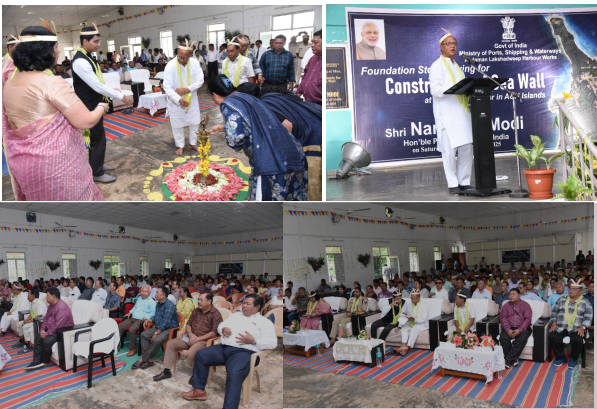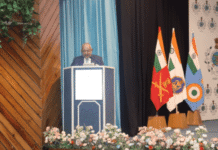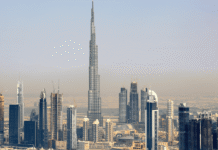The foundation stone for the much-awaited Mus Seawall Construction Project in Car Nicobar was laid today by Prime Minister Narendra Modi through virtual mode from Bhavnagar, Gujarat. A parallel event was held at Mus, Car Nicobar, drawing a large turnout of community members, district officials, and representatives of the Tribal Council.
The local function began with a traditional welcome for the dignitaries, including the Member of Parliament Bishnu Pada Ray, Deputy Commissioner Amit Kale, Superintendent of Police Rahul Nair, and Tribal Council Secretary Martin Luther. Guests were greeted with cultural performances, ceremonial lamp lighting, and a welcome song presented by local artists.
During the technical briefing, Mamta Jijith, Deputy Chief Engineer of the Andaman Lakshadweep Harbour Works, explained that the seawall will stretch 450 metres and be built at an estimated cost of Rs.47 crore. The project will incorporate tetrapod technology to absorb wave energy, thereby offering long-term protection from coastal erosion and cyclonic storms that have repeatedly affected the Mus region.
Addressing the gathering, Tribal Captain Martin Luther highlighted the project’s importance for safeguarding villages, roads, and livelihoods. MP Bishnu Pada Ray described the initiative as a reflection of the government’s vision of “Sabka Saath, Sabka Vikas, Sabka Vishwas, and Sabka Prayas,” underscoring its alignment with the broader development goals for island territories.
The event also featured cultural showcases, where Nicobarese artists presented traditional performances alongside themes of national unity, receiving wide appreciation from the audience.
The gathering later tuned in to the live telecast of the Prime Minister’s address from Gujarat. His announcement was met with applause and enthusiasm, reflecting the community’s anticipation for a project that promises to bring lasting benefits.
The Mus region has long been vulnerable to sea surges, which have damaged habitations, disrupted fishing and agriculture, and eroded critical infrastructure. The seawall project is expected to mitigate these risks by strengthening coastal defenses, protecting livelihoods, and ensuring a safer future for younger generations.
Community members at the event collectively acknowledged the Prime Minister’s development-driven approach, viewing the project as part of a broader effort to integrate remote island communities more closely with the national mainstream. For residents of Car Nicobar, the Mus Seawall Project represents not only physical protection but also a symbol of inclusive growth and government commitment to safeguarding island ecosystems.






